Talia Baroncelli and Paul Jay discuss Russian threats to use tactical nuclear weapons against Western Europe and what role China can play in solving the existential crisis of climate and threats of nuclear war—part 2 of 2.
Russian Anti-War Activist – Boris Kagarlitsky – Paul Jay (part 1/2)
Talia Baroncelli
Hi, I’m Talia Baroncelli, and you’re watching theAnalysis.news. I’ll shortly be joined by your other host, Paul Jay, for part two of my discussion with him on the recent arrest of Russian anti-war thinker Boris Kagarlitsky. Hopefully, you’ve already watched part one and have enjoyed that content. If so, please consider donating to the show so that we can continue making these episodes. You can go to our website, theAnalysis.news, and hit the donate button at the top right corner of the screen and get onto our mailing list; that way, you won’t miss any future episodes. See you in a bit with Paul.
Paul Jay
So I don’t think China’s position is so socialistic, let’s put it that way. There’s a real mix of what I would say is a kind of central planning rationality mixed with a nationalist, geopolitical, great nation mentality. If you compare Chinese decision-making to American decision-making, I think the Chinese are more rational when it comes to geopolitics, generally speaking. As a state-managed capitalism, it’s been brilliant in the way it’s accomplished its external commercial relationships.
In terms of Chinese national interest, China is now the major trading partner of almost every country on Earth. The U.S. talks about competing with China. In many ways, China’s already won in terms of trading relationships. China, I believe, is the number one trading partner of the United States, never mind just about everybody else. It’s the number one trading partner of most of Western Europe, certainly most of Latin America and Africa. There’s nothing the U.S. can do about it, and that’s part of the American quandary.
That said, I don’t get why China isn’t more urgently dealing with climate. If you look at the heat maps, what the world looks like at two, three and then four degrees, China is already in record-breaking heat waves. This is just the beginning. We’re at 1.2 degrees warming. We’ll be at 1.5 within a decade; some think even faster. If you look at three and four degrees, there’s not much of China left. That said, there isn’t much of the U.S. left either in terms of agriculture, especially in the Midwest and the West Coast. I don’t get why China isn’t urgently screaming about this.
I think the Chinese argument that the Americans are being completely hypocritical about this is very legitimate. The U.S. talks a lot more than it does. The lack of phasing out of fossil fuels is a critical issue, obviously, and it’s not happening. They keep talking about carbon sequestration and such, and that’s mostly nonsense. They don’t want to do what obviously needs to be done: nationalize the fossil fuel companies, America, and phase them out quickly. As quickly as that energy can be replaced, and it can be replaced quickly with a massive investment in sustainable energy sources.
I don’t know what to say about nuclear. There are various people making the argument, even James Hansen, the climatologist, that you can’t get out of this without nuclear. Others are arguing, well, if that’s true, then maybe we have to reduce the size of the economy. Maybe, I don’t know if that’s politically possible. I do know we need as an absolute to phase out fossil fuel as quickly as possible and phase in forms of sustainable energy. We also have to figure out how to decarbonize. That’s going to take; I guess I said that already. There needs to be a massive, massive investment in a publicly run for the public interest, not some private sector boondoggle project to figure out what real effective decarbonization is—not greenwashing. Not dangerous geoengineering that nobody even knows if it won’t do more damage. We do need to combine the phasing out of fossil fuel with decarbonizing the ocean and the growing of massive amounts of trees, regenerative agriculture. We’re not putting much resources into any of that because it’s basically really being left up to the private sector in the marketplace with some government money to juice it. Even if we move more quickly to electric cars and such, okay, it’s something, it’s maybe better than nothing, but we’re still not transforming how electricity is produced. So that’s where our focus needs to be.
Ukrainians, as difficult as it is, when you have soldiers, Russian soldiers, slaughtering your people, you got to see the bigger picture because there won’t be a Ukraine in the future. Do not believe that the West is going to rebuild you when the West is in such a crisis. I don’t know how much the West would rebuild Ukraine even if there wasn’t such a climate crisis. Maybe they would. Maybe it’d be like a South Korea, which is they want to show how wonderful Ukraine is rebuilt as a model to try to undermine Russia and try to prove to the Russian people.
Talia Baroncelli
They’re already giving out contracts to different companies for rebuilding.
Paul Jay
One way or another, it’s going to be a boondoggle.
Talia Baroncelli
It’s not going to be rebuilt in a way which is sustainable.
Paul Jay
Yeah, without getting further on the climate thing and all the rest right now to get back to it. So that’s why I think there must be a settlement on this, more or less along the lines of where things are. Without this war of attrition, Russia seems dug in. Even if a Ukrainian offensive has some success and I have no idea what’s really going on on the battlefield, I don’t know who to believe.
Eric Schmidt, who used to run Google, is a scientific advisor to Biden. He was on TV the other day, and his assessment was very pessimistic that the Ukrainians could breach the Russian defenses. He said maybe they could do something with hundreds of thousands of drones, which they don’t have. So it would mean the West would have to supply drones and a ridiculous amount of drones. Who knows if the Russians wouldn’t figure out a way to fight that?
A war of attrition that goes on for years is going to be devastating for the Ukrainian people, devastating for the Russians that are thrown wave after wave into this battle and devastating to the world. Never mind what it’s doing in terms of grain exports and how much that’s going to devastate parts of Africa, maybe Asia, and so on, but what it does to global politics.
I hope China and the U.S., and I don’t know whether these recent meetings of [Antony] Blinken going and [Janet] Yellen and before them, maybe more importantly, the big tech leaders. [Bill] Gates was there, the head of Apple was there, and Larry Fink from BlackRock was there. The real power brokers of America, the leaders of the billionaire class, went to China, and they seemed to have sent the Biden administration a message to cool this thing down. This is getting nuts over Taiwan. Don’t you jeopardize this Chinese market for us. We know that Gates understands the threat of climate. We know Larry Fink gets it. They’re not doing much about it, but we know they get how serious it is. They know there’s no solution without a Chinese American collaboration.
The Chinese are saying something interesting, which is not illegitimate. They said this to John Kerry, the American climate czar or whatever he is.
Talia Baroncelli
Czar.
Paul Jay
They said, okay, fine, let’s collaborate on climate. But how do we take them seriously? Number one, when the last president of the United States didn’t believe there was a climate crisis, and we don’t know who’s next. So what if we make all these agreements with you, and in 2024, we’re dealing with a climate denier? Two, you’re waging chip wars against us, trying to restrain our economy, and then you want to have a collaboration on climate. Three, you’re sanctioning the technology we have to make better batteries for dealing with the climate crisis to make better solar and wind power energy. The batteries are sort of the weak link in the chain there.
The Chinese position isn’t illegitimate, and then they get caught up in the conflict over Taiwan, which is all nuts because it’s clear the Chinese don’t want to invade. But the more the Americans provoke them, the more the hawks in China. That’s the thing; we’re not dealing with some monolithic entity in China. There are a lot of splits and divisions, as there are in every country. The hawks in China are saying, okay, this has gone too far. You’re offending our national dignity. These elements of humiliation and national dignity are an important part of the narrative of how the elites in every country maintain control. So even though they’re objectively nonsensical, the issue of humiliation and national dignity has brought us to the brink of nuclear war many times. Right now, we’re looking at it again.
Why won’t Putin get the hell out of Ukraine? Why doesn’t he go back to the February 23 [border]? There’s no strategic reason. It’s got nothing to do with NATO. It’s clear Ukraine’s not getting into NATO. Why? Because it would be humiliating. There’s no other real reason for it. It would be humiliating.
Why did [John F.] Kennedy blockade Cuba? Not because Cuba was any threat. The Soviet missiles in Cuba were no threat. [Robert] McNamara told Kennedy, this is a political problem for you domestically. There’s no objective strategic issue with these missiles. There’s nothing these missiles could do in Cuba that the Russian subs can’t already do. Kennedy risked nuclear war to avoid humiliation. The problem is, we live in that world, so you got to deal with it as a factor.
So what’s the conclusion to all this? This is where Boris and I disagree. The West, with China’s help, does need to give a way for the Putin state to get out of this without looking the fool.
Talia Baroncelli
Well, you were speaking about China’s reaction to the U.S.’s attempt to decouple its economy from the Chinese economy, which is incredibly difficult to do, given that they rely on each other’s markets for exports. Some analysts have said that this attempt to decouple the U.S. economy from China if it goes too far and it antagonizes the Chinese and doesn’t have the desired effect, it could actually lead to China being emboldened to invade Taiwan.
Paul Jay
I don’t think the U.S. is serious about decoupling. They can’t. Are you giving up on a market of a billion and a half people? There’s no seriousness. What there is seriousness in is trying to strengthen American productive capacity to better compete with China in the global economy and not be so dependent on China for production. The issue of chips is a big issue because the chips that matter are made in Taiwan.
Now, the company that’s the leading chip manufacturer is itself fairly integrated into China. Much of the Taiwanese chip production actually happens in China in plants designed by and run by the Taiwanese company. The guy that owns the major manufacturing chip company is actually for less antagonistic relations with China. One must understand Taiwan is not monolithic on this issue of its relationship with China. Much of Taiwan, both elites and the population, just want the status quo. They’re not looking for independence. There are sections of the Taiwanese elites and some of the population that are pushing full-fledged independence. The far right of the United States is pushing it, too. Other than some crazy ideological motives which exist in the U.S. and maybe in Taiwan, it’s an almost war that really serves the military-industrial complex of the United States, and for that matter, Taiwan.
For years, apparently, Taiwan has been buying these weapon systems, which cost Taiwan a fortune, because it’s not like some other place like Israel that gets all kinds of subsidies from the United States. Taiwan actually pays for these weapons. A lot of the weapon systems Taiwan was buying were ridiculous because they were so massive they couldn’t have been used against a Chinese invasion. It was like paying tribute to the U.S. for protectionism. Ellsberg used to call NATO a protection racket. Well, that’s, to a large extent, what the U.S. has going on with Taiwan.
Also, domestic players make a lot of money in these contracts, whether it’s through outright corruption and bribery or other ways like getting local spin-off contracts off the U.S. military weapons purchases. So there’s a lot of money to be made in almost war, not actual war. An actual war, most analysts think, goes nuclear pretty fast, or if it stays conventional, the Chinese win.
So there’s a conflict of economic forces. I’ve said this before, Boeing is a good example. Taiwan is an important purchaser of Boeing weapon systems and military aircraft. I think Taiwan might be in the top 20 purchasers of Boeing military stuff. China, at least until recently, and I think still because one of the things China is not as advanced in its commercial aircraft. China was, and I think still is, one of the biggest purchasers of Boeing commercial aircraft.
In one company, one part of the company wants less tension with China to sell more commercial aircraft. Another arm of the company wants more tension over Taiwan so they can sell more arms. The system is not rational. It’s filled with these contradictory interests, and the policy reflects that— the foreign policy. Especially Americans, they don’t know what the hell to do.
To get back to your question, the only country or place in the world right now that’s really well-positioned to try to bring the Ukraine war to an end is China. Will they do it? I don’t know. Maybe they’re making some noises that way. When one of the senior people in the Chinese Foreign Ministry was asked, “Why don’t you come right out and condemn the invasion when you say you support the UN charter and the issue of sovereignty?” His answer was, “Well, somebody’s got to be able to be able to mediate this thing.” Well, if that’s the reason, they won’t come out and condemn it, and I don’t think that’s the only reason. I think right now, Russia’s being turned into practically a satellite of China. From a pure nationalist interest, there’s geopolitical interest to have let it carry on this long. I think that interest is coming to an end. The longer this stalemate goes on, the weaker and more bled Russia becomes, the more desperate it becomes.
We were going to talk about this, and we might as well now. Some of the voices in Russia, leading foreign policy voices, are calling for using tactical nuclear weapons against Poland. Not against Ukraine because they still want to act as if Ukraine are our brothers as they slaughter tens of thousands. Against Poland because the only real threat Russia has here, the only real weapon, is the nuclear threat. Nobody, they’re saying, will really take it seriously if you don’t do it. It’s part of the Russian military doctrine. It’s called escalate to de-escalate.
This was explained to me yesterday by an expert in Soviet and Russian nuclear planning. It was at a time when the NATO forces were far weaker; conventional NATO forces were weaker than Russian. NATO always had as an option; if we started losing on a conventional battleground, we would go nuke to balance things—the threat of going nuke made up for our weakness conventionally. Well, now things are flipped around the other way.
Western Europe, the NATO forces in Europe are conventionally much stronger than Russia. If it was a straight conventional fight without nukes, the West would win. I’m told by everybody who knows these things. We can see right now Russians aren’t even winning in Ukraine, never mind against the whole of NATO, including the U.S. The Russians are doing what NATO said. If we start to lose conventionally, we will have to prove we’re willing to use nukes. The way to prove it is to do it. There are voices in Russia that are saying if this thing goes on for years, it will sap our ability. There’s only so long we can sustain a war of attrition in Ukraine. If we start to lose, the only answer we’re going to have is to give up, the collapse of the Russian state, which means the resignation of whether it’s Putin or whoever’s next with Putinism after Putin. That’s the most likely thing right now. What follows Putin is another Putin or even someone more hawkish. Or use nukes. They’re saying, if that’s where this ends up, we might as well do it now.
Talia Baroncelli
To give some context to our viewers, the expert or analyst you’re speaking of is Sergey Karaganov from the Russian equivalent of the Council on Foreign Relations. I believe at the beginning of June, he published a piece called A Difficult but Necessary Decision, which sparked a huge debate among other policy thinkers in Russia. He was essentially arguing that the threshold for using nuclear weapons should be lowered because the West is no longer really scared or fearsome of Russian sabre-rattling, so to speak, and that some sort of preemptive attack would essentially be the way to go if the U.S. and Europe were to continue supporting Ukraine.
I think that did spark a debate. There were some people and other policy circles in Russia who condemned this position and said that there would never be an instance in which a preemptive strike would be justified because that would just spell the end of Russia and Europe, obviously. In response to that, he actually wrote another piece called There is No Choice: Russia Will Have to Launch a Nuclear Strike on Europe. So he even doubled down on that position. I do think he represents a certain segment of Russian debates, and it’s pretty insane, but the person who actually has the nuclear codes is President Putin. We don’t really know what he’s thinking.
In the Russian state policy documents from 2020, it does say that a nuclear or tactical nuclear attack or the use of nuclear weapons could be justified if the existence of this state were to be put into jeopardy. That’s a really tricky categorization because what does that mean? If the regime is put into jeopardy? If Putin’s regime is put into jeopardy, does that then justify a strike, or does that doctrine just refer to the Russian state? If the Russian state is put into jeopardy, so we don’t know what he’s thinking.
Paul Jay
Yeah, what you’re referring to is very important. What’s this guy’s name again? I always forget.
Talia Baroncelli
Karaganov.
Paul Jay
Karaganov is not a nobody. This equivalent of the Council on Foreign Relations goes back to the Soviet days. It is the assembly of the leading foreign policy thinkers of Russia. When they have their annual conferences, Putin speaks there sometimes. The most recent one, [Sergey] Lavrov, spoke there. They are a very serious body. This guy, Karaganov, is the Chairman of the Presidium. He’s like the leader of this thing. He’s a serious foreign policy voice. I’ve talked to people that know him, and he’s been a hawk since Soviet days. A hawk in Soviet and then Russian terms, which means the way to deal with the West is with the most aggressive posture possible. Of course, the West has given lots of reasons to think that.
In the Congress that happened just after he wrote those pieces, where Lavrov spoke, Lavrov didn’t say what he said, but he also didn’t say anything against what he said. What they did say at this Congress, and this is where the issue of what does it mean, the Russian states at threat. They define what’s happening now in Ukraine as a war with the West. This is not a war against Ukraine.
Now, the Ukrainians, of course, don’t agree with that. When this is called a proxy war in the West by some Westerners and people of the South, that’s only partly true. You can’t discount the agency and right of the Ukrainian people to resist this.
The Vietnam War was the same. The Vietnamese waged a national liberation war, and this was their war, but that didn’t mean it wasn’t a form of proxy war. The United States didn’t really care what the hell happened in Vietnam. This was all about national liberation movements moving towards socialism. Thus an alliance was what people thought was the socialist Soviet Union. You can debate whether it really was or wasn’t, but that doesn’t matter. It was going to take Vietnam and then other national liberation movements out of the Western sphere of capitalism. That was the reason for the war, and that’s the reason for the Ukraine war.
The Russians do not want Ukraine to be part of the Western sphere of capitalism. They want Ukraine to be part of the Russian sphere of capitalism. Why is there a separate Russian sphere of capitalism? Because the West didn’t want Russia in the E.U. They didn’t want to have to deal with the potential–
Talia Baroncelli
They didn’t want Ukraine in the E.U.
Paul Jay
No. They didn’t want Russia. No, the West wants Ukraine in the E.U. They wanted to extend the Western sphere of capitalism, but they didn’t want Russia because they didn’t think they could control Russia. The history, the culture, the size of the country, the size of the armed forces, the fact it was an equal nuclear power, they didn’t want that in the E.U. It would have become such a rival of the United States that it may have really become its own sphere of capitalism rather than the E.U. being part of the American sphere. The West European elites didn’t want it either. They didn’t for historic reasons and more contemporary reasons; they didn’t trust how powerful Russia would get within the E.U., all the other E.U. and even the Germans to some extent.
Imagine if there’d been a German-Russian alliance in the E.U., leading the E.U. What would that do to the American hegemony? The reason Russia is fighting for a Russian sphere of capitalism is because they were excluded. The West wanted Russia to be an oil-producing rump state. That was okay with the Russian oligarchs for quite a while because they were cashing in; they had their yachts and this and that. As time went on, the Russian state became stronger.
Now we’re at a stage where I’m quoting more or less from this recent Congress of this foreign policy group. They’re calling Russia a state civilization. The Russian nation, the Russian people, the Russian language, the Russian religion, and the Russian values, which they stress over and over again, mean family values, similar to marriages between men and women. It’s very homophobic. The values are toxic and not very different than American Christian nationalism. In fact, it really is a form of Russian Christian nationalism. I think they’re a very similar phenomena.
Within that context, the Russian foreign policy elites are saying a long, drawn-out battle in Ukraine might lead to a weakening of the Russian economy and this government. This government means the Russian state, which means Russian civilization. They identify the state and Putin. It’s not like a political party in the West. Like, if Biden goes down, somebody else comes up. Which party comes to power in the United States doesn’t threaten the state. At least, it never has so far. The state is much stronger than any particular leader or particular party. In Russia, that doesn’t seem to be the case.
Putin and the bureaucracy around him, the military around him, they’re too intertwined. Anyway, the analysis seems to be, if I understand it correctly, a long, drawn-out war in Ukraine is a threat to the Russian state civilization. If it’s a threat to the state civilization under this doctrine, there’s justification for the use of a tactical nuclear weapon to prove to NATO and the West that we’re willing to do anything to defend this state civilization.
Now, China has actually warned about this. I read Global Times all the time, which is essentially an English-language website run by the Chinese party. They have said, be careful what you wish for, West. If Putin gets desperate enough, if they think this is going to be the downfall of this Russian state, and then, to use Russian terminology, state civilization, you don’t know what might happen. Meaning nukes are not out of the question.
We’re in a very, very dangerous moment. I just talked to Nikolai Sokov, who worked in the Soviet Union, and for a couple of years under Putin, under Yeltsin, in the Soviet arms negotiations. He was a top negotiator with the U.S. He knows Soviet thinking and Russian thinking very well. He says he has never, ever in his life, 40 years involved in this, heard public statements about using tactical nuclear weapons. He says sometimes, privately, there were conversations like that, that it may come to this. He’s never heard that such things could be declared at such senior levels.
Then the argument goes, well, you can’t submit to Russian nuclear blackmail. Why not? Somebody has a gun to your head, and you don’t submit to blackmail if you’re going to get shot in the head? I would. Of course, it’s up to the Ukrainians. They don’t want to submit to it. Okay, that’s their right to keep fighting, but we don’t have to risk it.
More importantly, as I said, the climate issues are even more threatening than the rhetoric coming out on nuclear weapons, but they shouldn’t be taken so unseriously.
In the final analysis, what does it mean? I think, and this is where I go back to where Boris doesn’t agree with me. Boris’s thinking was if this war goes on long enough, sections of the Russian military would overthrow Putin. There are sections of the oligarchs that want this war over. Thus he thought Ukraine should keep fighting because it would lead to the downfall of Putin and what they call the nomenclature, the bureaucracy around Putin, and will create an opening for more revolutionary politics in Russia. I can’t say he’s wrong. Obviously, he knows Russian domestic politics way better than I do. I only know this. I should just say, as a Russian revolutionary, which is what he is, his perspective, the frame that he looks at this in is how to advance revolutionary politics in Russia. He thinks the victory and success of the Ukrainian war leads to the downfall of Putin. I don’t know; it’s a hell of a risky calculation.
A lot of people who analyze this, including Russians who are against the war, are not so sure what follows Putin isn’t worse. Right now, Sokov was telling me Putin’s main battle is not with the Kagarlitsky’s, it’s not with the left, and it’s not with the Liberals. His actual main battle is with the hawks who want an even more aggressive approach to the war in Ukraine. I think Putin’s calculation is that the Russian population doesn’t want more bodies coming home. He’s got a fine line there about how many lives he can risk. Digging in is the better strategy, which is what he seems to be doing. The right in Russia are apparently very strong.
I think, as a progressive living in North America, I advocate, for whatever it’s worth, not that too many people care what I advocate anyway, that no further arms should go to Ukraine without being linked to an insistence on negotiations. Two, those negotiations need to include a referendum, a UN-run referendum. There should be an immediate ceasefire and immediately, as quickly as possible, organized referendums. There may be other steps that have to be taken.
Let me address one thing; the issue of war crimes. Zelenskyy has said no negotiations with Putin. He should be charged with war crimes and all this. Yeah, of course, Putin should be charged with war crimes, but by who? Who has the legitimacy and credibility to charge and try Putin for war crimes? The only way to do it is that the United States would arrest George Bush and Dick Cheney and put them on trial for war crimes for launching the Iraq war. You might even consider arresting Barack Obama because under international law, as I understand it, he actually had an obligation to pursue, investigate and charge Bush and Cheney for war crimes. If you don’t pursue them, you become implicated. Obama may have other blood on his hands. We know he has other blood on his hands in terms of drone warfare.
It’s certainly not the British government that was hogged in the Iraq war. In terms of history, nobody has more blood on their hands than the British Empire. I mean, go on. Where exactly is it that has some credibility? Even some of the countries that weren’t so involved in the Iraq war, Canada really wasn’t much involved, but they were a complete collaborator with the U.S. in every other kind of war and war crimes. Any serious talk, no negotiations without charging Putin, it’s complete nonsense. It’s only said to avoid any negotiations or as a propaganda thing.
Talia Baroncelli
Yeah, I’ve discussed this with Colonel Larry Wilkerson in the past too. John Bolton was the one who negotiated certain deals with other countries so that they wouldn’t be held liable for war crimes or for other crimes they had committed before the International Criminal Court. Essentially, the International Criminal Court has no jurisdiction anymore to try American war crimes and hostilities.
Paul Jay
Yeah, and the U.S. never signed the agreement to be in the ICC, as did Israel and such. Anyway, it is beyond stupidity to have that kind of rhetoric. Maybe Zelenskyy has to go before these negotiations can take place. The hagiography about Zelenskyy. He could have taken NATO off the table, and maybe this wouldn’t have happened. To turn him into this great hero. The Ukrainian people are fighting a heroic fight, there’s no doubt, and they have a right to.
Talia Baroncelli
The thing is that Zelenskyy would probably be the only one with legitimacy if he actually did decide to negotiate with Russia and say that there should be some sort of ceasefire. I feel like probably more people would follow him.
Paul Jay
The Americans are saying we won’t do it if the Ukrainians don’t want to. There’s no reason why the U.S. can’t say, well, fine, don’t negotiate if you don’t want to, but we don’t have to give you arms if we don’t want to. So obviously, the U.S. has enormous leverage, but so do the Chinese. The Chinese can say, listen, you negotiate, or we’re going to find our fossil fuel somewhere else.
Talia Baroncelli
To a certain extent, Turkey as well. Turkey, under President [Recep Tayyip] Erdoğan, for example, they were the ones who negotiated the Black Sea grain deal. Some argue that Russia pulled out of the deal because they were upset with Turkey for giving back five Azov fighters who were fighting in Mariupol to Ukraine. They initially agreed that they would keep them in Turkey until the end of the war, and that allegedly upset the Russians. I don’t know who has more leverage in their relationship, in Turkey’s and Russia’s relationship, but Turkey can potentially emerge as a negotiator for some sort of ceasefire. It seems like they’re also for Ukraine joining NATO.
Paul Jay
Well, the whole thing is nuts. Russia has pissed Turkey off by cancelling this grain deal because Turkey was making a lot of money out of this. In some ways, Russia’s pushing Turkey closer to NATO. Of course, Turkey’s already in NATO. The whole thing is nuts.
To go to the very beginning of all this, I hope people do watch the Kagarlitsky interviews. Actually, we’ll put them all up on one page. Let’s not forget Boris right now is sitting in jail somewhere in Russia. They moved him to somewhere in the outskirts, and it’s very possible he’s looking at seven years or maybe more. His daughter said in an interview that’s just the beginning of the charges. They can come up with a lot more charges. Boris could be looking at quite a bit of jail time here.
Talia Baroncelli
Well, thanks, Paul, for joining me to speak about Boris’s arrest and the war in Ukraine. We obviously hope that Boris will be released as soon as possible, and our thoughts are with his family.
If you enjoy this content and you enjoyed watching Boris Kagarlitsky’s interviews that Paul has done with him in the past, then please go to our website, theAnalysis.news. Consider donating to the show and getting on the mailing list so you’re always updated whenever there’s a new interview published. Also, go to the YouTube channel, theAnalysis-news. You can hit the bell so that you’re notified every time there’s a new episode and like and subscribe to the channel. See you next time.
Podcast: Play in new window | Download | Embed
Subscribe Apple Podcasts | Spotify | Android | iHeartRadio | Blubrry | TuneIn | Deezer | RSS
Never miss another story
Subscribe to theAnalysis.news – Newsletter
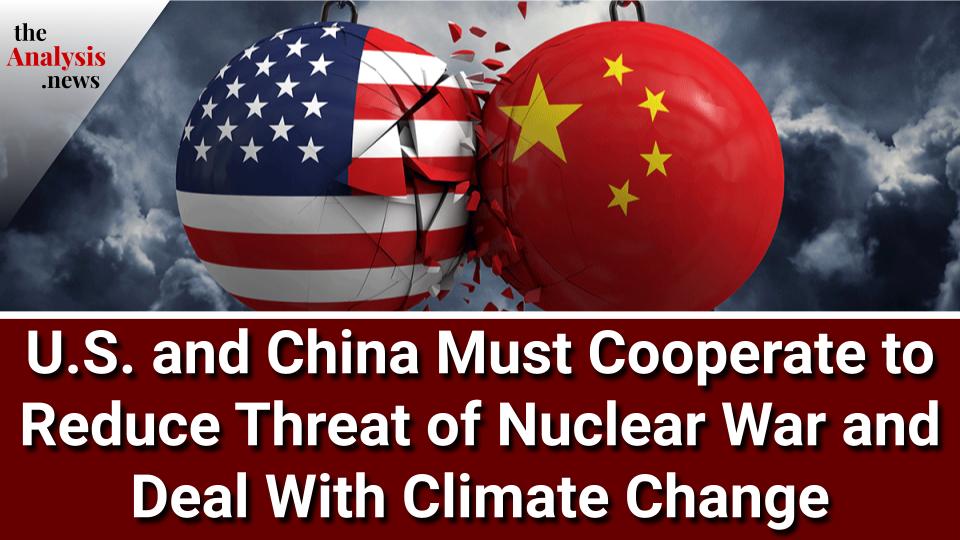
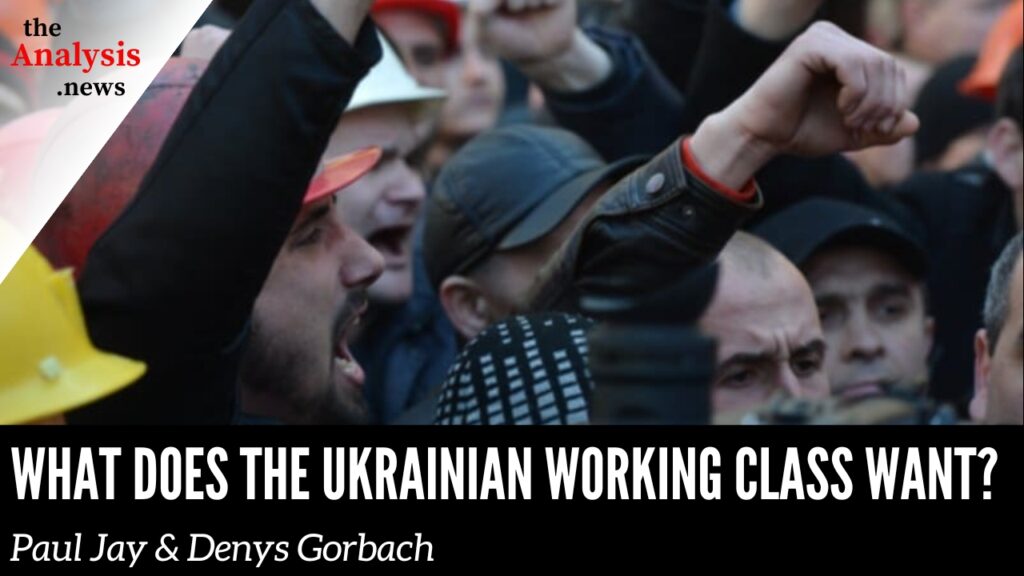


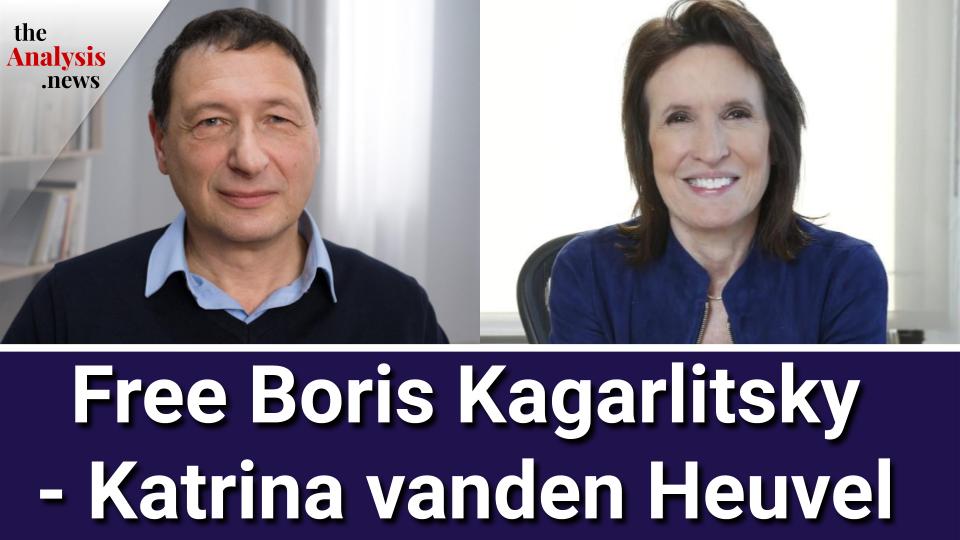
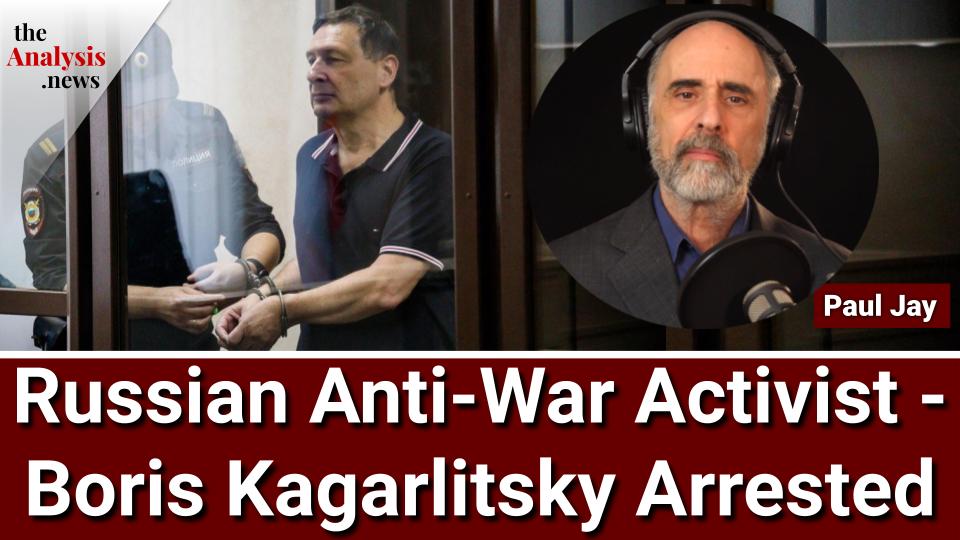
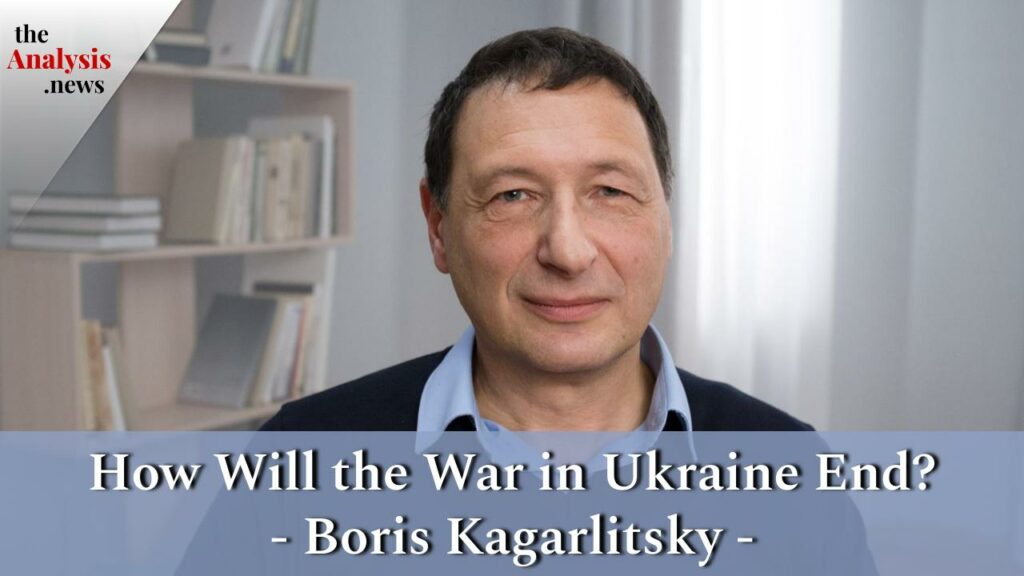
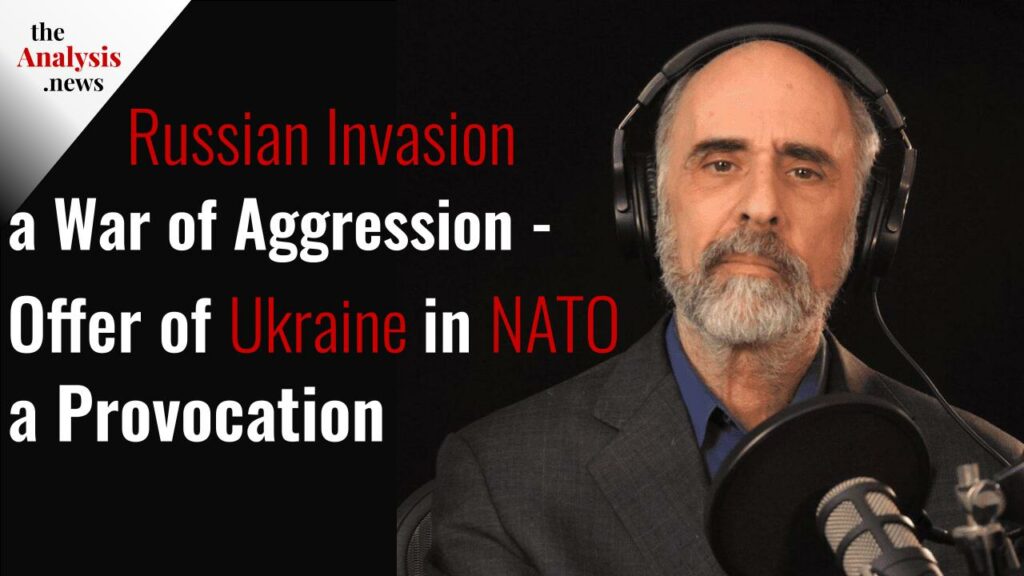
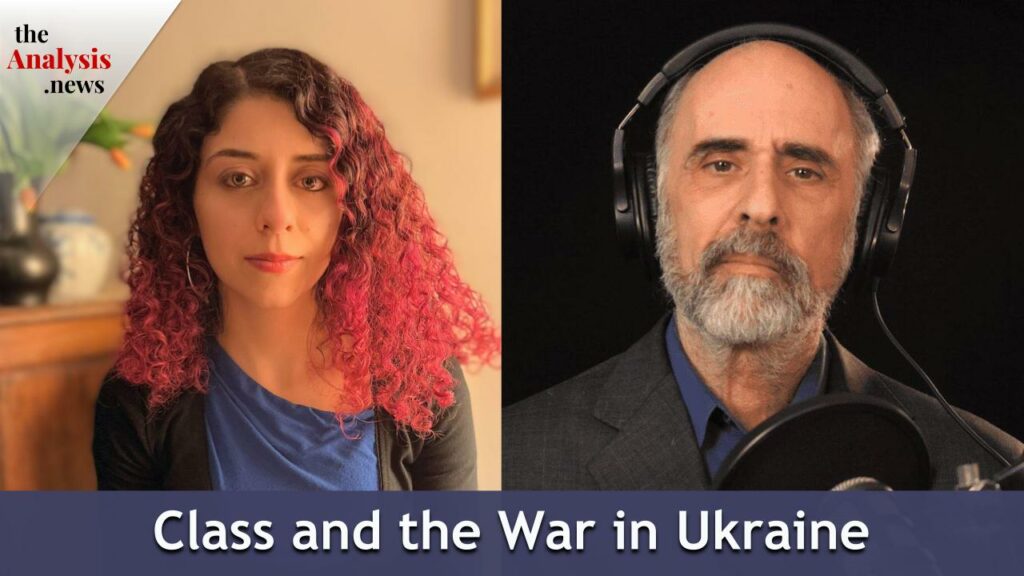

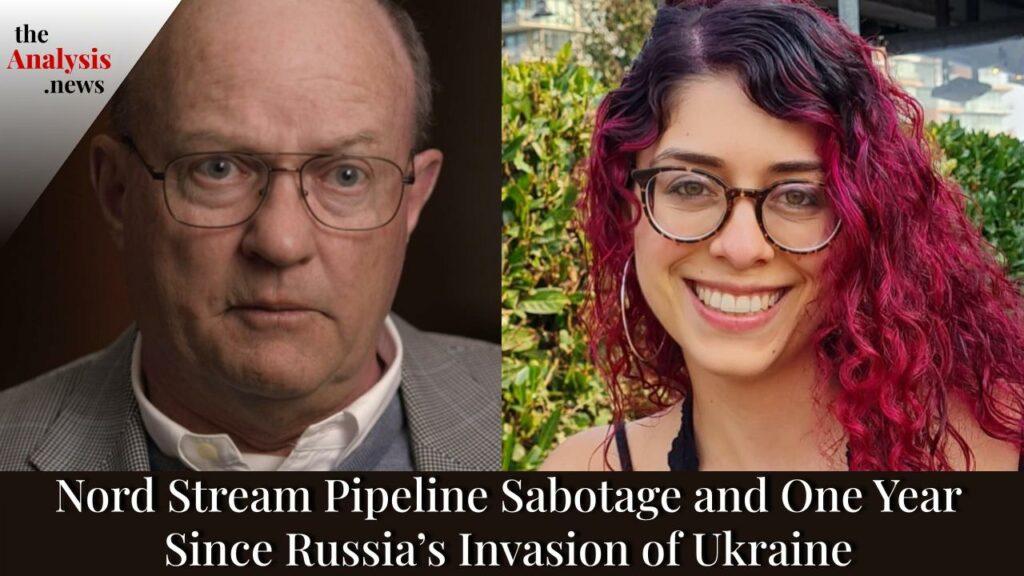
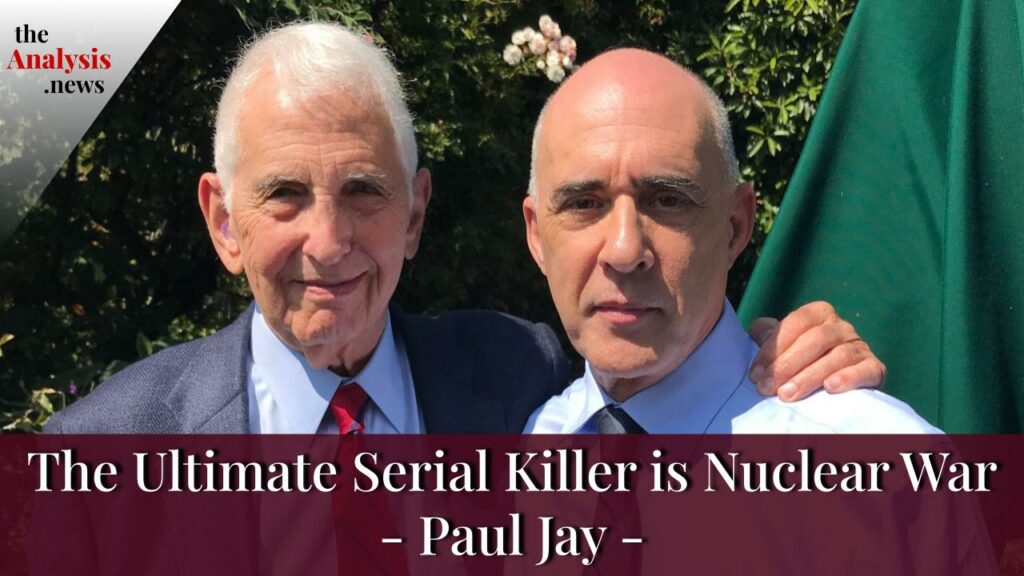

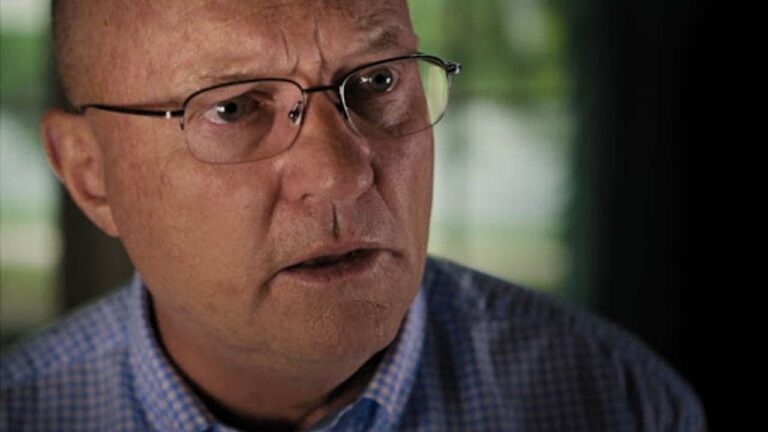


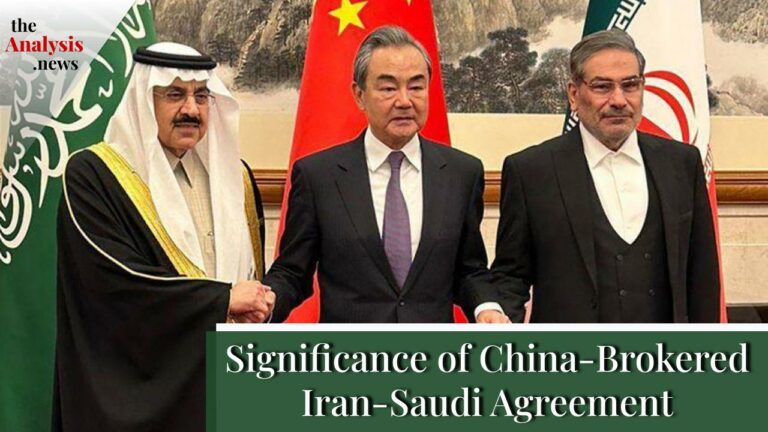
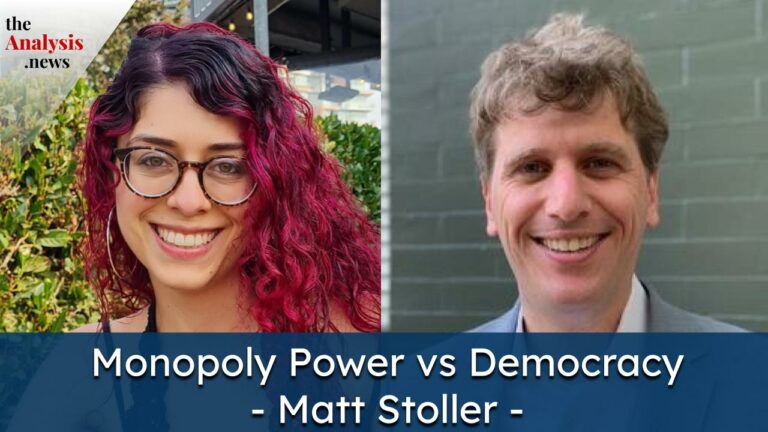
26:00 – Paul, how can you make the argument that this war came about because of what “Russia wanted for Ukraine” when it was brought about by what the US wanted for Ukraine and had been investing in and planning up, since before 2014?
Russia in almost everything I’ve read anyway, said Ukraine could do whatever it wanted as long it remained neutral. Meanwhile the US and I guess the EU was determined to yank Ukraine completely away from Russia and grab Crimea back under its insistance that Crimea belonged to Ukraine – with no consideration of Crimea’s importance to Russia, and the ceding of Ukraine from the USSR by Krushchev. Crimea is a complicated question that would be better settled in the World Court or the UN if either of those institutions worked. Then the other reason is that all Russia’s border states are being armed and turned against Russia.
Yanukovych withdrew from signing trade agreements with the EU because they demanded that Ukraine totally sever ties with Russia – at which point the US began to call him a Russian puppet and planned to overthrow him … which really meant that he refused to be an American puppet, and they replaced him with a President who was willing to be an American puppet, and even build up Ukraine’s military to attack the Donbas and to get Crimea back – which was all an American priority against Russia – not anything the Ukrainian people cared about.
The obvious question to ask is why wasn’t this settled by partitioning Ukraine, or other peaceful reasonable means? I think you even expressed that you thought this was due to the US refusing to engage in negotiations.